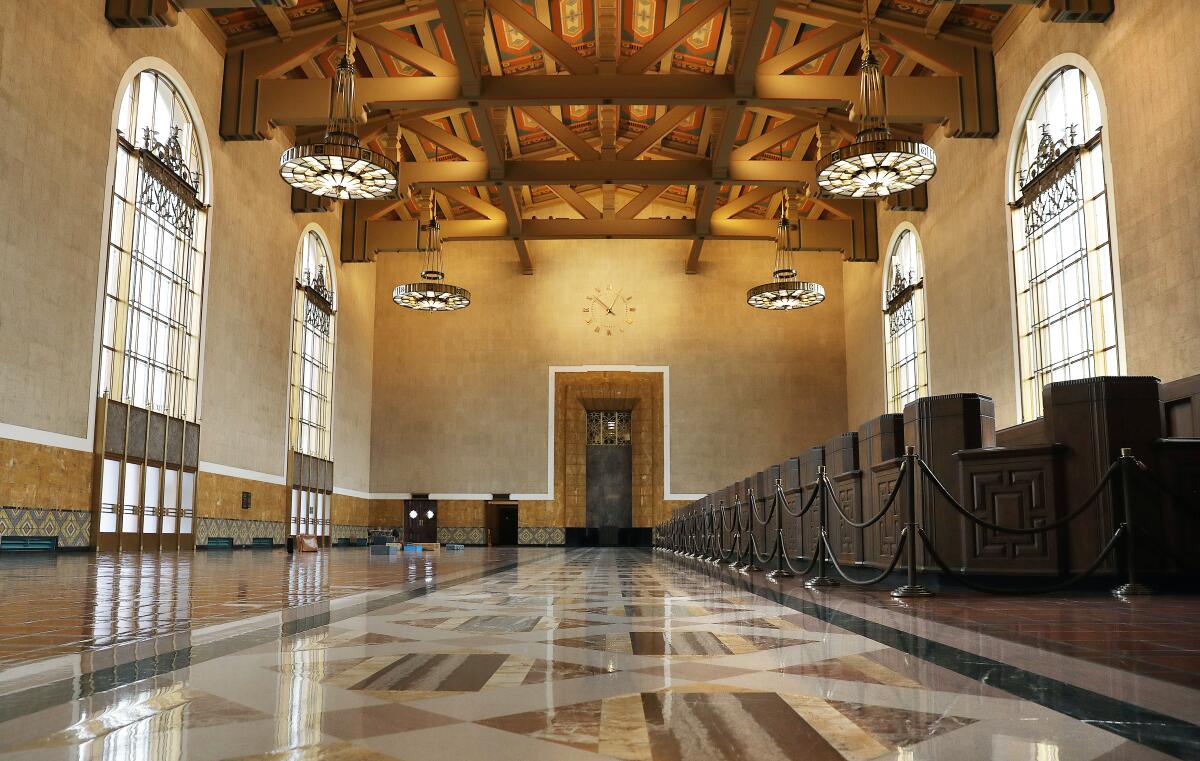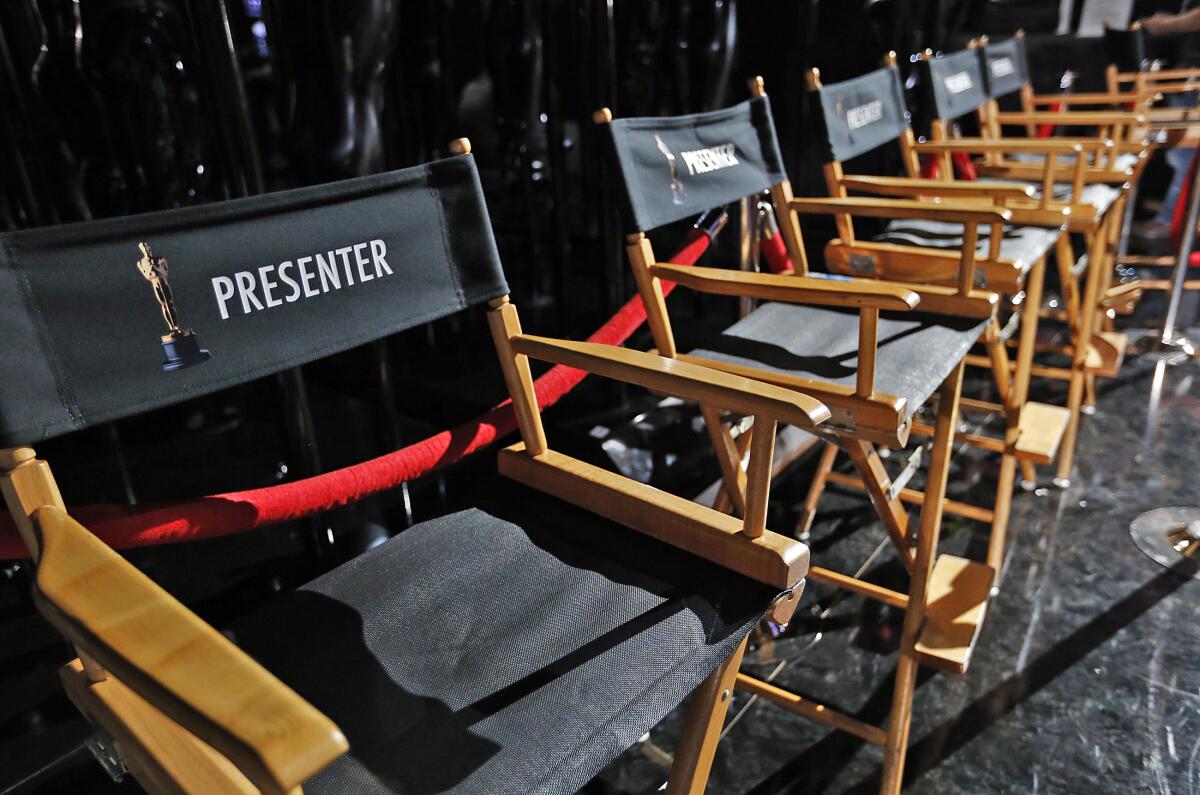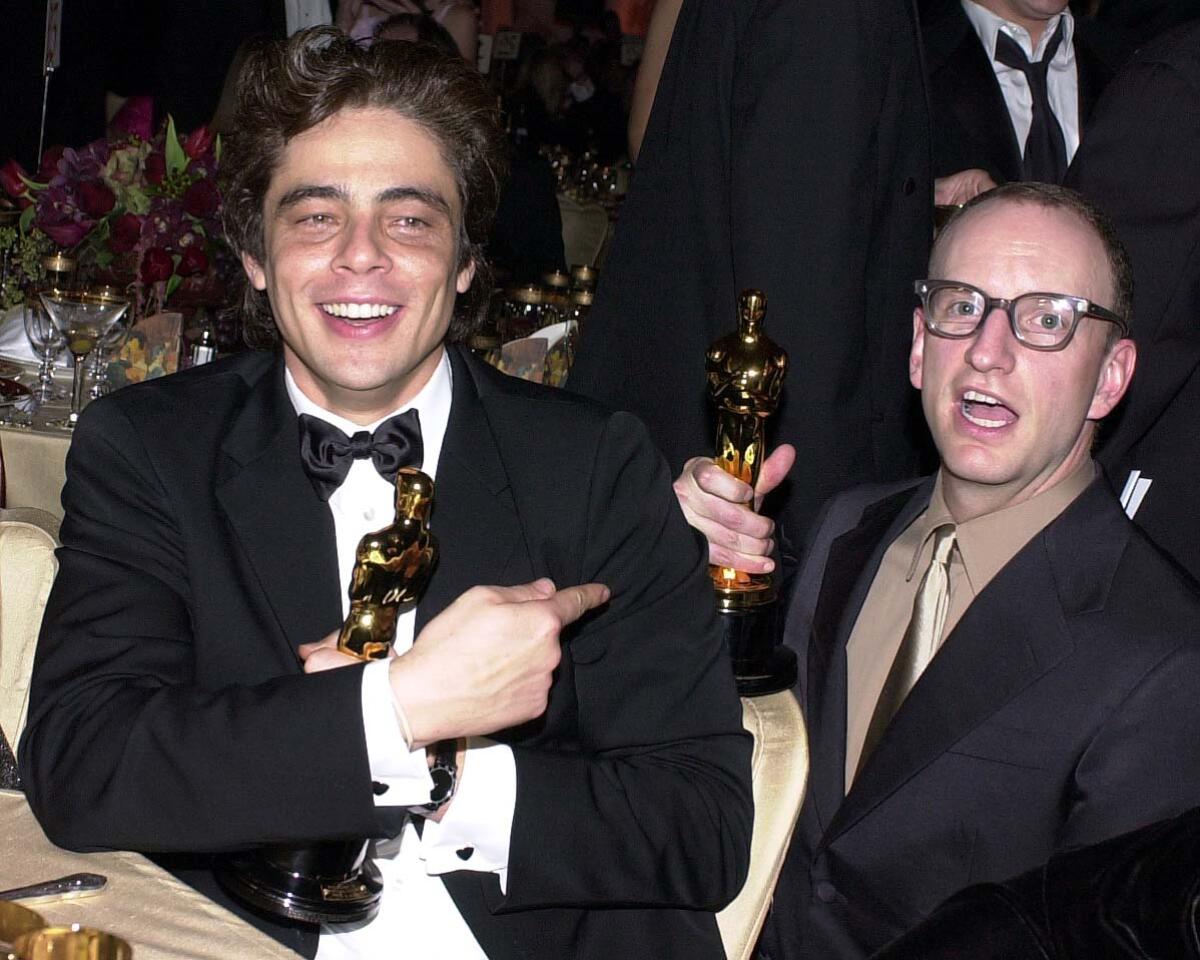Oscar producers feeling good about their show. ‘It’s about the emotion ... the energy.’
Producing the Oscars is a difficult and often thankless job even in a normal year — and as you may have noticed, with a global pandemic upending life in Hollywood and around the world, this year has not exactly been normal.
“My attitude coming in was, you have to surrender to the fact you’re just going to be a human piñata,” director Steven Soderbergh, who is producing the 93rd Academy Awards alongside Stacey Sher and Jesse Collins, told The Envelope over Zoom this month. “And if you do surrender to that, you’re kind of free to do what you want. We don’t read the comments section, because that way lies madness.”
None of this year’s all-star trio of producers has ever produced the Oscars, which will be held April 25 after being pushed back two months due to the pandemic. But no one can question their bona fides.
Soderbergh has directed more than 30 movies, including “sex, lies, and videotape,” “Ocean’s Eleven,” “Magic Mike” and, fittingly, “Contagion.” Sher earned best picture nods for producing the films “Django Unchained” and “Erin Brockovich.” Collins has produced numerous awards shows and TV events, including this year’s Super Bowl halftime show and last month’s Grammy Awards.
Still, since signing on in December, the three have faced unprecedented hurdles — and an unprecedented level of scrutiny. Last month, the Oscars producers announced there would be no Zoom acceptance speeches during this year’s telecast, sparking a backlash from some nominees who worried they couldn’t make the trip to L.A., where the show will be held at Union Station and the Dolby Theatre. To accommodate those concerns, the show’s production team is now working around the clock to set up a separate hub in the UK as well as more than 20 satellite feeds for other more far-flung nominees.
The stakes for this year’s Oscars are enormous. With movie theaters across the country starting to open their doors again, the movie business desperately needs the kind of shot in the arm that a glittering celebration like the Oscars can provide. But at the same time, ratings for other pandemic awards shows have been dismal, and this year’s crop of nominees lacks the sort of massive blockbusters that could entice a large viewership.
The Envelope spoke with Soderbergh, Sher and Collins in a joint call about how they’re navigating this year’s many challenges — and what we can expect from what is sure to be an Oscars like no other.
With the show now just weeks away, how are you feeling?
Soderbergh: People are working seven days a week, long hours. The good news is it feels like it’s coalescing. There are times in a project of this complexity when things feel like they’re flying apart. But that’s not our sensation right now. It’s been tricky. Everything we’re trying to do we’re trying to lead with a strong creative idea. We don’t want COVID being an excuse for anything in terms of the creativity of the show. It’s still got to be an entertaining show.

Different awards shows have handled the challenges of the pandemic differently, with varying degrees of success. What have you learned from previous shows that you wanted to avoid?
Collins: I think one of the biggest mistakes that you can make in a situation like this is to try to figure out how to do the same show in a COVID environment. If you just say, “We’re going to do the exact same Oscars but just with no audience,” I think you will have missed an opportunity to try something different. When we all got together, I was really excited that we were all on that same page, and we came up with an organizing principle for the show that has not been seen before in terms of Oscars past.
Soderbergh: Yeah, look, there was a lot of talk about our “anti-Zoom stance.” For us, it was just frustrating to imagine this stunning set that David Rockwell is building at Union Station and then, for a high point, you cut to somebody sitting on their couch with a laptop in front of them. It’s the f—ing Oscars. It’s not a webinar. So we’re just trying to get people somewhere where we can really make it look great. We want everybody to participate. It is our desire to hook up the people who can’t come to Los Angeles through satellites and not through Zoom.
Were you surprised at the pushback you received from some people when you announced that no-Zoom policy?
Sher: We were between a rock and a hard place, and there were things we could say and things we couldn’t, because we didn’t have all the information. It’s completely fluid. As the doctors like to say, we may be done with COVID, but COVID is not done with us. So we erred on the side of not giving all the information until we had real information, and people didn’t respond too well to that. But that’s the situation we’re in — hence Steven’s human piñata.
You obviously want the Oscars to have a celebratory feel, but at the same time, it’s been an extremely tough year for the movie business, and we’re not out of the woods yet. How do you strike the right tone?
Soderbergh: The last 14 or 15 months have been unprecedented in their devastation and dislocation, and you have to acknowledge that while at the same time offering up a little bit of pain relief for a couple of hours. To try to strip away the self-importance of it without becoming snarky or insincere — it is a real balance. We want it to be joyful, and we do want people to rebuild their relationship with going to the movies. We’re all in a very synchronized place in terms of what the tone has to be. But I guess we’ll find out.

Sher: We’ve lost a lot, and our lives are forever changed. We’ve been through the sadness of high school graduation in a parking lot with your car stereo — I personally have. But it’s time to figure out how to not just look at what we’ve lost. These people made extraordinary films, and this is about the celebration of excellence. And we need these reminders to buoy us. We need to stay motivated to get into the end zone. We’re so close, but we’re not there yet.
You’ve said that the plan is for this year’s show to have the feel of a movie. That sounds intriguing, but what exactly does it mean?
Soderbergh: As I like to say, we’ve seen the UFO, and you’re not going to see it until April 25. All you can do is take our word for it that in terms of its visual approach, its cutting patterns, the way it sounds, everything is going to feel more like a film. We’re shooting at 24 frames per second, we’re using a slightly wider screen format. As soon as it starts, it’s going to feel, look and sound different, and we hope we can sustain that throughout the evening and have it contribute to a sense of being inside a piece of cinema in which some awards happen to be given out, as opposed to just a typical award show.
As nutty as it’s been, as a process, it’s also really exciting. I feel like some of our big ideas are strong, and I’d rather see a 75% level execution of a really good idea than 100% level of execution of a mediocre idea. It’s not about perfection. It’s about the emotion of it and the energy.
Though there’s a strong crop of best picture nominees this year, many people haven’t seen them. With theaters shut down, some have wondered whether there should even be an Oscars. What do you say to that?
Soderbergh: I think it’s an incredible array of of films this year. It’s unprecedented in its diversity and representation, and I find them all very accessible. I don’t feel like, because there were no blockbusters due to theaters being closed, that somehow the best picture nominees are art house fare. These are very emotional, palatable films that are very good and clear about what they’re doing. We couldn’t have been happier when the nominations came out.

There are perennial criticisms that the show is too long and there are too many categories. How else do you plan to innovate, especially around the technical categories, when a lot of viewers take bathroom breaks?
Collins: I think we have a creative approach for those craft categories that people tend to say don’t get the ratings — that could make the audience lean in. Regardless of the field, everyone loves to hear about greatness, and that’s what we intend to celebrate. So if you have a major movie star telling you that these makeup people are the absolute best and they are some of my favorite coworkers, you’re going to lean in and want to understand that, because it’s never been approached like that before.
Soderbergh: Clearly, we haven’t done a good job in the past of trying to connect people to those categories, so we’re really going hard at this, because we feel we can prove that they’re worth everybody’s time. I don’t have a problem with people going to the bathroom. I just want them to be in a hurry to get back.

Even in a normal year, critiquing the Oscars has become a kind of bloodsport. Are you ready for that?
Soderbergh: Let’s be clear: I’ve indulged in it, as we all do. But we’re hoping this year that there won’t be as much hate-watching as maybe there has been in years past. The tagline “bring your movie love” is both a genuine ask and a call to action for a viewer. There’s a message underneath that, which is, if you’re cynical about this or you’re bringing a really dark attitude, that’s not what we’re about tonight.
Steven, you were credited by a previous Oscars producer with giving the perfect acceptance speech when you won for directing “Traffic.” Are you confident this year’s speeches will have that kind of emotion and spontaneity?
Soderbergh: We think so, because of the year that it is and because of the relationship that we’ve tried to establish with all of the nominees through the interview process that we’ve subjected them to. Our plan is to encourage people to say something, and we’ve organized the show in such a way to make more room for the potential of those moments. The plan, at least for the people that can be at Union Station and be a part of the pre-show, is to sort of tee them up with something that feels a lot like the nominees luncheon, so that they’ll be relaxed. We hope it will be like a kind of velvet-lined chute that delivers them onto this plinth and they will be ready to sing their song.

In that spirit, I’m assuming there will be an open bar at this pre-show event?
Soderbergh: [dryly] Yeah, if only for me.
More to Read
From the Oscars to the Emmys.
Get the Envelope newsletter for exclusive awards season coverage, behind-the-scenes stories from the Envelope podcast and columnist Glenn Whipp’s must-read analysis.
You may occasionally receive promotional content from the Los Angeles Times.











